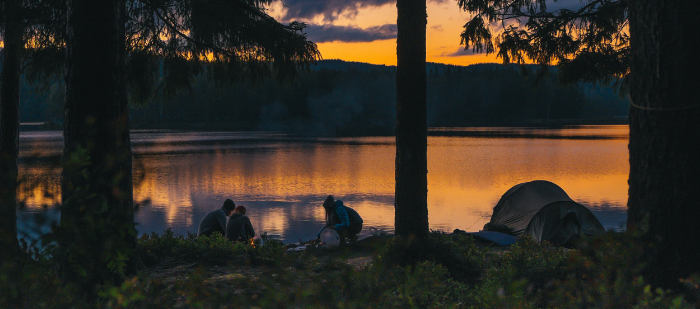Groups learn about their local area and wildlife

We spoke with the DofE Manager from New Bridge School, a SEN school in the North of England ab0out how they delivered their expeditions with a difference.
1. What were the expedition aims?
The groups had an environmental focus for their expedition aims, including learning about the local wildlife and investigating the local area.
2. What did the expedition look like?
The four groups completed expeditions in the local area. Some explored accessible areas of Daisy Nook and Heaton Park, following the watercourse to engage with different animals and discover underwater species using fishing nets.
Others explored Hollingworth Lake with time spent discovering the lakeside wildlife and local sculptures. One group even found time to skim stones and have a go on the balance beams on the adventure course.
“All the students worked well and were helpful and supportive with each other, pulling and pushing one group member’s wheelchair around the park and walking further than they had before.”
And finally the Nurture Group travelled from Dovestones through Greenfield to join up with the Huddersfield Canal and then along the canal to Diggle at the Standedge tunnel. The second day followed the River Medlock from Strinesdale to Park Bridge after an overnight camp at Dog Hill Scout camp.
“The weather was hot and sunny making going difficult as the group worked together helping one participant in his wheelchair over the many obstacles we encountered on a route which wasn’t as ‘wheelchair friendly’ as we expected.”
“We designed and made our own pizzas for tea and then watched the lights of Manchester by our campfire before we retired for the night.”
3. What did you need to consider to organise and lead this expedition?
The option for some participants to go home overnight enabled some of the centre’s more physically and medically challenged students to participate in an expedition, as to stay over would require hoists, electrical equipment, additional equipment for sleeping as well as additional staff.? Equipped centres have been used previously by the centre for overnight stays, but this increases the cost, reduces numbers and requires more resources.
Next year, the centre is planning on offering a range of accommodation options again with participants either camping, staying in a bunkhouse on the same site or going home overnight. Participants will progress to Silver with expeditions spread across two years to prevent any upheaval caused by multiple expeditions.
4. As a Leader, what did you notice about the outcomes for participants doing this expedition??
“The groups were outstanding, working closely as a team, encouraging and helping each other and also demonstrating great courage and resilience as they each faced their own challenges.”
Two participants commented that “I enjoyed the challenge and being out with my friends, also it was great the way we encouraged each other and worked together to solve the problems” and “‘I liked exploring and visiting different places and the way we all helped each other”.
In addition, one participant’s parents said that they were amazed their son had taken part at all as he was so far out of his comfort zone after initially refusing to take part.




